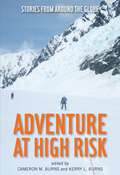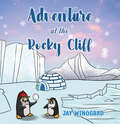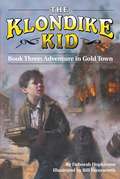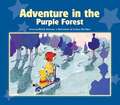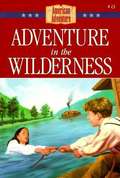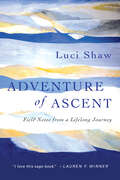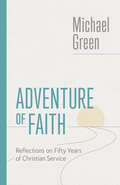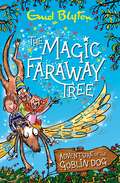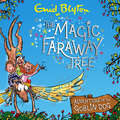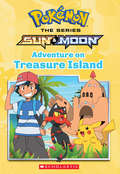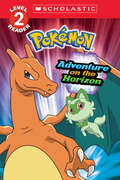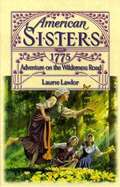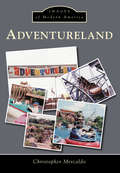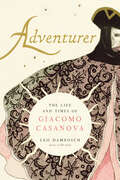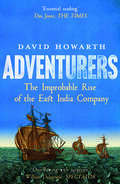- Table View
- List View
Adventure at High Risk: Stories from Around the Globe
by Cameron Burns Kerry BurnsA collection of some of the world’s greatest adventures Anyone with a thirst for adventure and a courageous spirit will be captivated by the tales of endurance, determination, strength of mind, and perseverance recounted in this outstanding compilation. The stories in this book, be they fact or fiction, represent some of the most gripping and illuminating writing ever penned on the subject of adventure from across the globe. From straightforward narratives to spiritual reveries, adventure prompts men and women to pour forth essays, articles, and books that are unlike any other field of literature. Editors Kerry L. Burns and Cameron M. Burns showcase the amazingly vast spectrum that adventure literature offers.With contributions by:Matt GerdesLinus Lawrence PlattRobyn DavidsonJon TurkCameron M. BurnsDoug PeacockPeter McBrideStephen VenablesRoger W. BruckerRichard A. WatsonChris DavenportJonathan WatermanJohn AckermanDean CummingsChristina DodwellEdmund Stump
Adventure at the Rocky Cliff
by Jay WinogradClutch and Haiven were two young penguins who lived in Penguin Land way down near the South Pole. Clutch was playful, brave and adventurous. He often imagined that he was a brave warrior penguin. Haiven was serious, careful and cautious, and enjoyed studying and playing the violin. Even though they were very different, they were still best friends, and often hung out together. They always did their best to remember the three rules of life: work hard, be kind to others, and be on time. One day, Clutch and Haiven decided to go to the Rocky Cliff. While Clutch would jump and dive into the water, Haiven would give him scores as if it were the Penguin Olympics. For a while, both penguins were having lots of fun. All of a sudden, Haiven found himself in very serious danger. Nobody, not even Clutch, could help him get out of the danger he was in. He had to learn to be brave very quickly.
Adventure in Gold Town
by Deborah Hopkinson Bill FarnsworthThe trip down the Yukon River from Lake Bennett to Dawson City is exciting and dangerous, but Davey's adventures don't end once he arrives at the bustling mining town. Dawson is overrun with sad-looking, abandoned dogs Davey longs to help, but what can a twelve-year-old boy do? And how will he ever find his uncle Walt among the thousands of people who have flocked to the Klondike in search of gold? Even more important, what will happen to him if he can't? But Davey's problems are forgotten when fire threatens to destroy the town. Will Dawson survive? And will Davey find what he's looking for among the ashes?
Adventure in Nakuru
by Juma BustaniThe Junior Readers series has been specifically designed to encourage reading for pleasure and to meet the supplementary needs of upper primary school children. Wide and repeated reading of books in the series should enable pupils to automatically improve their written and spoken English. Adventure in Nakuru is the first of Juma Bustani's adventure series. It is an exciting story in which the trio of Abia, Frank and Truphosa help Lake Nakuru from pollution by a band of international "industrialists"
Adventure in the Haunted House
by Page McBrierWhile Oliver cat-sits for a vacationing friend, the cat runs off and gets lost in a haunted house. Dogs. Snakes. Gerbils. Ducks. Animals are Oliver Moffitt's business, and there is no pet-care job he can't handle. So it should be no problem for him to take care of Princess Fluffy, a friend's pampered cat. Unfortunately, the life of a pet-care expert is never so simple. It's bad enough when Princess Fluffy gets loose and disappears inside a spooky, boarded-up house. But when Oliver hears a ghostly sound from inside the "empty" house, he calls on his friends to help him find the missing cat. And that's when the funny--and scary--adventures really begin! Pictures are described. Ages 7-12
Adventure in the Wilderness: The Journey to Cincinnati's Frontier (Barbour Book's The American Adventure, Book #13)
by Veda Boyd JonesEverything is changing. Betsy Miller and her cousin, George Lankford, are moving with their families to the river city of Cincinnati, a journey that will take weeks of traveling on ships, wagons, and flatboats. As they explore America's big cities, meet a Native American, foil a thief's plans, and narrowly escape drowning, Betsy and George just can't seem to get along. Facing one adventure after another in the wilderness, will Betsy and George ever learn to work together?
Adventure is Everywhere (Fountas & Pinnell LLI Purple #Level S)
by Jacqueline AdamsAdventure is Everywhere By Jacqueline Adams
Adventure of Ascent: Field Notes from a Lifelong Journey
by Luci ShawIn this book, writer-poet Luci Shaw has given us a lifetime of exquisite reflections on nature, love, death, suffering, loss, faith, doubt, creativity, curiosity, lifelong learning—all of it drawn from the breadth of her own experience, harvested in penetrating and lyrical insights. Still active in her eighties, Luci now turns her attention to the season of edging toward the borders. Her spirit of adventure, her brave transparency, and her openness to all that life offers (as well as inflicts) makes her a captivating and hope-inspiring mentor. For most of us, growing older is a reality we put off as long as possible—until we realize with a shock that it is happening to us. We immediately look around to see how others on the path just ahead of us are dealing with it. So here is the intrepid Luci Shaw, taking readers on a virtual hike with her, with steps more deliberate and slow but also with surprising vistas that fill us with gratitude. In this book Luci serves as a fearless and eloquent scout. As she traverses new territory, she records her experiences lovingly, honestly, sorrowfully, joyfully—here's what it's like, and here's what to be ready for. These field notes will inform your own journey, no matter what your age.
Adventure of Faith: Reflections on Fifty Years of Christian Service (The Eerdmans Michael Green Collection)
by Michael GreenMichael Green shares his story of faith and ministry—and offers insight into the church&’s present challenges and future hope. Michael Green invites us to join him on a journey through a lifetime in Christian ministry. From his conversion to the present day, he recounts times of fruitfulness and failure and points to those people and ideas that have shaped and inspired him. Alongside relating his experiences, Green also reflects on crucial issues in today&’s church and world. Ultimately, he sets forth a vision of hope for the future of the worldwide community of God. Evangelical Christians will find Green&’s life, work, and ideas inspiring in their own journeys of faith and ministry.
Adventure of the Goblin Dog
by Enid BlytonAdventure of the Goblin Dog is a stand-alone Magic Faraway Tree adventure by the world's best-loved children's author, Enid Blyton.Discover the magic! Travel to the top of the Magic Faraway Tree with Peter and Mary on their quest to rescue a princess.Back in print for the first time in a generation, this is a wonderful introduction to the world of the Magic Faraway Tree. Explore Fairyland in this magical story, where you'll encounter the Goblin Dog, rescue a princess and visit the Land of Storytellers. This story first appeared in 1936 and was made part of the Magic Faraway Tree world in 1952, featuring different children discovering the Faraway Tree. The Magic Faraway Tree series is one of Enid Blyton's best-loved and most enduring creations.***The Magic Faraway Tree ®, Enid Blyton ® and Enid Blyton's signature are Registered Trademarks of Hodder and Stoughton Limited. No trademark or copyrighted material may be reproduced without the express written permission of the trademark and copyright owner.
Adventure of the Goblin Dog (The Magic Faraway Tree #5)
by Enid BlytonAdventure of the Goblin Dog is a stand-alone Magic Faraway Tree adventure by the world's best-loved children's author, Enid Blyton.Discover the magic! Travel to the top of the Magic Faraway Tree with Peter and Mary on their quest to rescue a princess.Back in print for the first time in a generation, this is a wonderful introduction to the world of the Magic Faraway Tree. Explore Fairyland in this magical story, where you'll encounter the Goblin Dog, rescue a princess and visit the Land of Storytellers. This story first appeared in 1936 and was made part of the Magic Faraway Tree world in 1952, featuring different children discovering the Faraway Tree. The Magic Faraway Tree series is one of Enid Blyton's best-loved and most enduring creations.***The Magic Faraway Tree ®, Enid Blyton ® and Enid Blyton's signature are Registered Trademarks of Hodder and Stoughton Limited. No trademark or copyrighted material may be reproduced without the express written permission of the trademark and copyright owner.
Adventure of the Goblin Dog (The Magic Faraway Tree #5)
by Enid BlytonDiscover the magic! Travel to the top of the Magic Faraway Tree with Peter and Mary on their quest to rescue a princess.This is a wonderful introduction to the world of the Magic Faraway Tree. Explore Fairyland in this magical story, where you'll encounter the Goblin Dog, rescue a princess and visit the Land of Storytellers. This story first appeared in 1936 and was edited by Enid Blyton herself to become part of the Magic Faraway Tree world in 1952, featuring different children discovering the Faraway Tree. The Magic Faraway Tree series is one of Enid Blyton's best-loved and most enduring creations.(P) 2019 Hodder & Stoughton LimitedThe Magic Faraway Tree ®, Enid Blyton ® and Enid Blyton's signature are Registered Trademarks of Hodder and Stoughton Limited. No trademark or copyrighted material may be reproduced without the express written permission of the trademark and copyright owner.
Adventure on Dolphin Island
by Ellen PragerA family vacation aboard a rented sailboat turns into a horrible nightmare when young Kelly Wickmer is swept off the boat in a raging storm in the Bermuda Triangle. Alone in the wild sea, the timid young girl must struggle for survival and fight her fears of the ocean and its creatures, especially sharks. As darkness surrounds her, a nearby wave explodes in shimmering light and a dolphin appears. The dolphin brings Kelly to a mysterious tropical island, unlike anything she has ever seen or heard about. Kids on the island befriend her as they encounter stingrays, sea turtles, iguanas, giant tortoise, the fish of a coral reef, and more. Yet, Kelly longs to go home. As she searches for a way off the island and the dolphin that saved her, she will have the adventure of a lifetime. If she survives, it will change her life forever. Adventure on Dolphin Island combines the best of fiction and non-fiction, with an exciting story of fantasy and adventure blended with fascinating true details about the sea and marine life. A percentage of the profits from sales will go toward marine education.
Adventure on Treasure Island (Pokémon Chapter Books)
by Jeanette LaneThe new Pokémon are here, and kids gotta catch 'em all! This title features the cool Alola Pokémon from Nintendo DS games, Pokémon Sun & Moon.There's so much to explore in Alola! Ash and Pikachu are visiting one of the tropical islands off Melemele's coast. There they discover all sorts of new and interesting Pokémon. But these new Pokémon can be a bit tricky! Can Ash and Pikachu rescue a mysterious Alolan Water-type... and persuade a mischievous new Pokémon to join their team? This illustrated chapter book is based on a thrilling three-part Pokémon Sun & Moon storyline that can be seen on Netflix.
Adventure on the Horizon (Scholastic Reader, Level 2)
by Maria S. BarboKids can practice their reading skills with Pokémon in this fun Level 2 Reader!Meet Sprigatito in this Level 2 Reader! Liko gets her very first partner Pokémon, Sprigatito. It's so cute! But the pair have trouble bonding. When a suspicious stranger shows up looking for Liko, can she and Sprigatito work together to get away from trouble?This easy-to-read book features an exciting but simple story based on an episode from the hit Pokémon animated TV series. Full-color illustrations on every page!
Adventure on the Wilderness Road 1775 (American Sisters)
by Laurie LawlorEveryone warns of Indian ambushes as Elizabeth Pogue, her nine-year-old sister, Martha, and their family begin the dangerous trip on foot to Daniel Boone's new settlement in Kentucky But the only thing bothering Elizabeth is her bratty younger sister, Martha -- until she disappears. Then, without thinking, Elizabeth races into the savage wilderness to find the sister she tried not to love. . . .
Adventure with a Secret Prince
by Andrea BolterIn Andrea Bolter&’s latest romance, an adventure that started in Miami could turn out to be forever in New York…They started in Miami…And found forever in New York! Prince Ras has a few weeks of freedom left before he must marry for duty. He doesn&’t plan on wasting a second! But when he meets Gracie aboard a cruise ship, he recognizes the same need for adventure in her eyes. As they travel the East Coast, Gracie welcomes the distraction, which takes her further from her disastrous past—and closer to Ras! Except the secret he&’s hiding could change everything…From Harlequin Romance: Be swept away by glamorous and heartfelt love stories.
Adventure, Mystery, and Romance: Formula Stories As Art And Popular Culture
by John G. CaweltIn this first general theory for the analysis of popular literary formulas, John G. Cawelti reveals the artistry that underlies the best in formulaic literature. Cawelti discusses such seemingly diverse works as Mario Puzo's The Godfather, Dorothy Sayers's The Nine Tailors, and Owen Wister's The Virginian in the light of his hypotheses about the cultural function of formula literature. He describes the most important artistic characteristics of popular formula stories and the differences between this literature and that commonly labeled "high" or "serious" literature. He also defines the archetypal patterns of adventure, mystery, romance, melodrama, and fantasy, and offers a tentative account of their basis in human psychology.
Adventure, Mystery, and Romance: Formula Stories as Art and Popular Culture
by John G. CaweltiIn this first general theory for the analysis of popular literary formulas, John G. Cawelti reveals the artistry that underlies the best in formulaic literature. Cawelti discusses such seemingly diverse works as Mario Puzo's The Godfather, Dorothy Sayers's The Nine Tailors, and Owen Wister's The Virginian in the light of his hypotheses about the cultural function of formula literature. He describes the most important artistic characteristics of popular formula stories and the differences between this literature and that commonly labeled "high" or "serious" literature. He also defines the archetypal patterns of adventure, mystery, romance, melodrama, and fantasy, and offers a tentative account of their basis in human psychology.
AdventureCat Goes to School
by Susan Clymer[from the back cover] "Who sits high up on the classroom flagpole? Who leaves a mouse's head on the teacher's chair? Who curls up inside a desk and goes to sleep? Who gobbles chicken in the cafeteria? AdventureCat tells the story of her first visit to school. What a story! What a cat!" AdventureCat is brave, curious and outspoken. She even calls the teacher names! Contains frequent use of spelling changed to resemble the accent a cat would have if it could speak such as: freeeee, lifffffee, rowling, Meeeooowwwser, dogsss, cat-lamity and booooyyyy.
Adventureland
by Christopher MercaldoSince 1962, Adventureland has been entertaining and thrilling the Long Island community. The park was constructed in a rural area of Suffolk County around the time of a suburban boom eastward on Long Island, which brought enormous population growth in Nassau and Suffolk Counties. Since its opening, the park has seen significant change, with numerous rides and attractions being moved or retired to make way for newer attractions. Published here are images of the park throughout its entire history, many of which have never been seen by the public before. Adventureland shares early lost attractions and retired fan favorites in full living color, allowing both the young and the young at heart to remember the park in all of its stages, from opening to today.
Adventurer: The Life and Times of Giacomo Casanova
by Leo DamroschA fast-paced narrative about the world-famous libertine Giacomo Casanova, from celebrated biographer Leo Damrosch &“Fully succeeds in communicating that &‘vivid presentness,&’ that &‘joyful eagerness&’ for life, which is what keeps us reading Casanova—and reading about him.&”—Gregory Dowling, Wall Street Journal &“A nuanced, deftly contextualized biography of an adventurer, an opportunist, and a man of voracious appetites . . . another top-notch work from Damrosch.&”—Kirkus Reviews (starred review) The life of the iconic libertine Giacomo Casanova (1725–1798) has never been told in the depth it deserves. An alluring representative of the Enlightenment&’s shadowy underside, Casanova was an aspiring priest, an army officer, a fortune teller, a con man, a magus, a violinist, a mathematician, a Masonic master, an entrepreneur, a diplomat, a gambler, a spy—and the first to tell his own story. In his vivid autobiography Histoire de Ma Vie, he recorded at least a hundred and twenty love affairs, as well as dramatic sagas of duels, swindles, arrests, and escapes. He knew kings and an empress, Catherine the Great, and most of the famous writers of the time, including Voltaire and Benjamin Franklin. Drawing on seldom used materials, including the original French and Italian primary sources, and probing deeply into the psychology, self-conceptions, and self-deceptions of one of the world&’s most famous con men and seducers, Leo Damrosch offers a gripping, mature, and devastating account of an Enlightenment man, freed from the bounds of moral convictions.
Adventurers: The Improbable Rise of the East India Company: 1550-1650
by David HowarthThe unlikely beginnings of the East India Company—from Tudor origins and rivalry with the superior Dutch—to laying the groundwork for future British expansion The East India Company was the largest commercial enterprise in British history, yet its roots in Tudor England are often overlooked. The Tudor revolution in commerce led ambitious merchants to search for new forms of investment, not least in risky overseas enterprises—and for these “adventurers” the most profitable bet of all would be on the Company. Through a host of stories and fascinating details, David Howarth brings to life the Company’s way of doing business—from the leaky ships and petty seafarers of its embattled early days to later sweeping commercial success. While the Company’s efforts met with disappointment in Japan, they sowed the seeds of success in India, setting the outline for what would later become the Raj. Drawing on an abundance of sources, Howarth shows how competition from European powers was vital to success—and considers whether the Company was truly “English” at all, or rather part of a Europe-wide movement.

